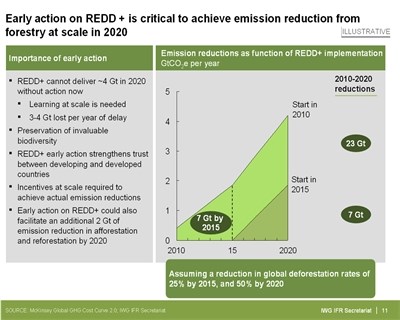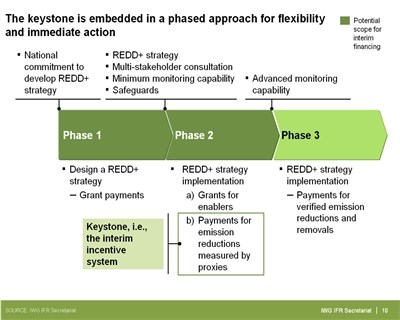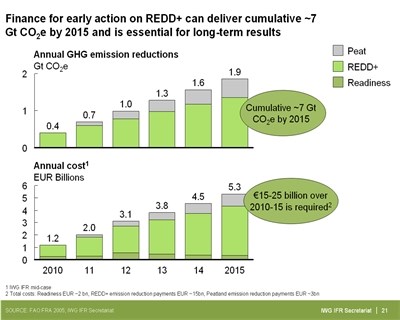World Leaders Praise the Report of the Informal Working Group on Interim Finance for REDD+
Historical archive
Published under: Stoltenberg's 2nd Government
Publisher: Ministry of the Environment
News story | Date: 20/11/2009
At the invitation of HRH The Prince of Wales, world leaders met in London on November19, 2009, to profile the findings of the Informal Working Group on Interim Finance for REDD+ (IWG IFR), which has now released its findings ahead of the Copenhagen climate summit in December. Developing countries stated their willingness to enter into an interim REDD+ partnership, and developed countries their willingness to find the needed financing to support their actions. The report was also widely praised by global business leaders and heads of large international non-governmental organizations.
Download the full report: Report of the Informal Working Group on Interim Finance for REDD+
Download Summary: Summary report of the Informal Working Group on Interim Finance for REDD+
The summary is also available in French and Spanish and as slideshow/outreach material
HRH The Prince of Wales has long been engaged in the battle against tropical deforestation. Previously this year, on April 1, 2009, HRH Prince Charles invited world leaders to London to discuss forests and climate change. They acknowledged the great importance of tropical forests in addressing climate change and emphasized the urgency of greatly scaling up funding for this purpose.
On that basis, The Informal Working Group on Interim Finance for Reducing Emissions from Deforestation and Degradation (REDD+) was established. This group has now released its report, which concludes on the necessity and the costs of short-term emissions reductions from forests in developing countries. The Government of Norway has held the secretariat for this international effort.
On November 19th HRH The Prince of Wales again invited to a high level meeting in St.James´s Palace in London - this time to profile and discuss the working group report. At the meeting, HRH the Prince of Wales praised governments for reaching what seems to be an emerging consensus on emergency funding to tackle tropical deforestation. Almost 40 countries have collaborated on the working group report.
The Prince said that he had been heartened by the Working Group’s findings and the support that these had received. The meeting was attended by two Heads of State - President Jagdeo of Guyana and President Bongo of Gabon - senior ministers from 18 countries, including the UK Secretary of State for Energy and Climate Change Ed Miliband, business leaders from a range of regions and industries, and many of the world’s leading environmental NGO’s (non-governmental organisations).
In a short keynote speech The Prince said:
- I have been enormously encouraged to hear the findings from [the IWG] report. It does seem that we have arrived at a consensus on how emergency funding might be deployed in the near future.
Tony Juniper, Special Advisor to The Prince’s Rainforests Project and former Director of Friends of the Earth hailed the report as a breakthrough: This is the first time there has been a consensus among governments on a mechanism to deal with the underlying causes of deforestation, which are mainly economic.
The IWG report outlines a process that would reward rainforest countries for reducing deforestation rates. Payments would be made on a performance basis, and by ensuring that the forests were worth more alive than dead the financing is aimed at encouraging rainforest countries to pursue more sustainable forms of economic development.

The report estimates that if financing of €15-25 billion were made available for the 2010-15 period for results based incentives, a 25% reduction in annual global deforestation rates may be achievable by 2015. Efforts on this scale could, if effective, reduce annual deforestation by about 3 million hectares per year, for an accumulated total emission reduction of 7GtCO2e for the period. They could also generate economic benefits for developing countries, including their indigenous peoples and local communities, conserve bio-diversity and protect water supplies.
Tackling deforestation is vital because rainforests play a crucial role in preserving life on the planet. They regulate rainfall, cool the climate, preserve biodiversity and, most importantly, store vast amounts of carbon. Tropical deforestation is a major cause of greenhouse gas emissions and ending the destruction of the world’s rainforests is essential if the battle against climate change is to be won.
To avoid dangerous interference with the climate system, global emissions must peak in the near future and be followed by sustained, deep cuts. Efforts towards Reducing Emissions from Deforestation and Forest Degradation, enhancement of carbon stocks, conservation and sustainable management of tropical forests (REDD+) will be crucial. Without REDD+ the goal in limiting the rise in global temperature will be much harder and substantially more expensive. With REDD+ we may significantly reduce, remove and avoid global emissions at a reasonable cost, while also taking due account of of the rights and livelihoods of indigenous peoples and local communities, protecting biodiversity, rainfall patterns and soil quality, and helping developing forest countries adapt to climate change.
All developing forest countries should be incentivized to participate in REDD+ partnerships, through a phased approach.

In phase one, developing countries would receive grants to develop a REDD+ strategy. In the second phase, grant support would be provided to build capacity, while large-scale payments would be provided for demonstrated results in reducing emissions. In the third phase, countries would receive payments for verified emission reductions and removals, and for the conservation of existing stocks.
At its core, the phased approach would provide an economic incentive structure that alters the economic balance currently favoring deforestation and degradation and disfavoring reforestation and conservation efforts.
Immediate action on REDD+ is a crucial part of the climate change solution. The key elements of a simple, effective, efficient and equitable mechanism could be set up by the end of the first quarter of 2010, based on the agreed outcome of COP 15 in Copenhagen. The Informal Working Group on Interim Finance for REDD might, if deemed useful by countires in the light of results at Copenhagen, reconvene in early 2010 to consider further steps to facilitate immediate action on REDD+.

Official press release from the Princes Rainforest Project